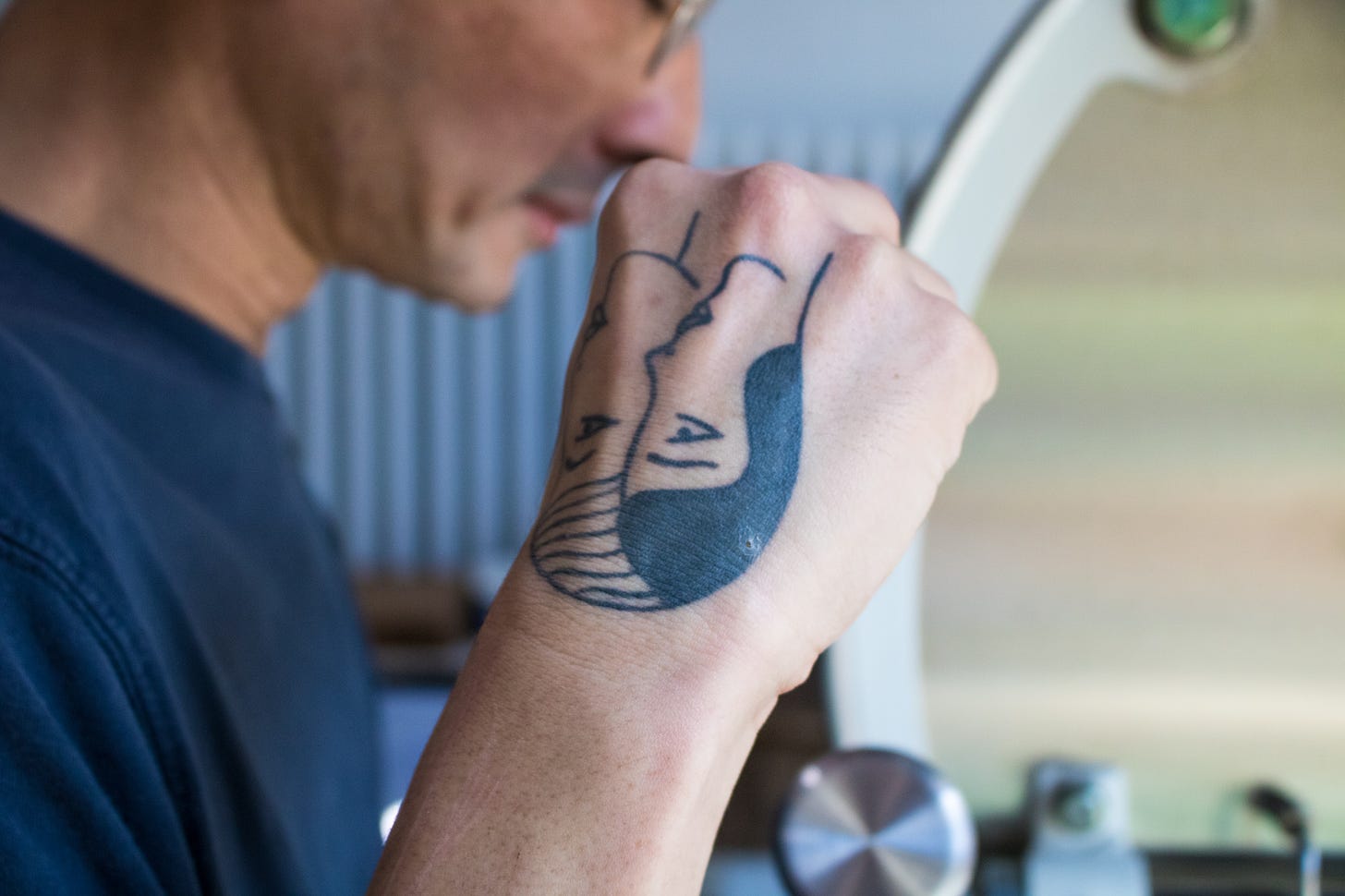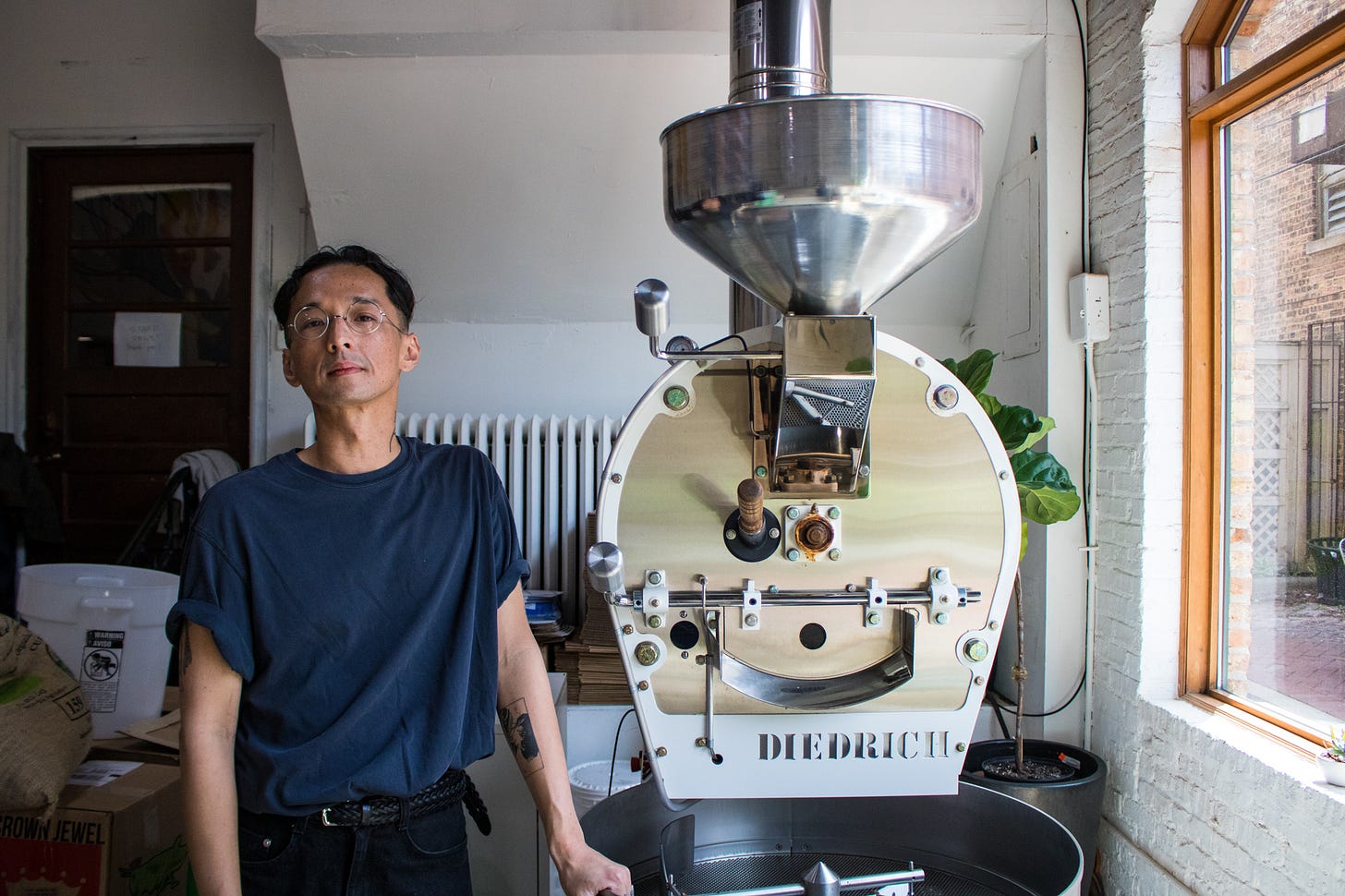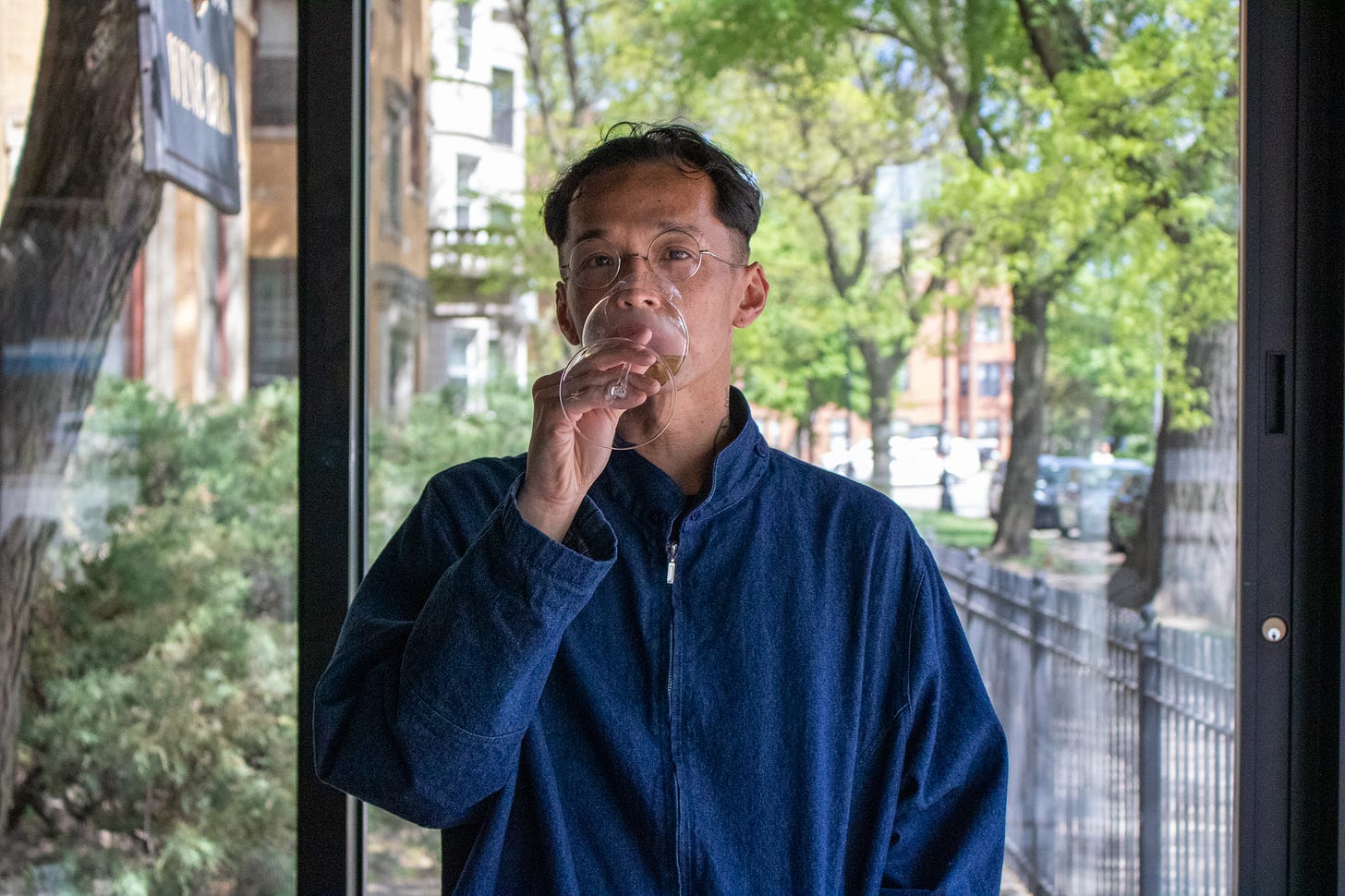Meet Your Barista: Mikey Rinaldo
The founder of New Math Coffee in Chicago talks art, escapism, and the creativity inherent to roasting.
Hey folks! I’m taking a break this month. As part of my summer hiatus, I’ll be publishing some personal favorites from the archives. Today, I’m sharing an interview I did with Mikey Rinaldo, originally written for the coffee publication Standart in August 2021.
Interviewing is what I love about my podcast, but I got to flex a totally new muscle for this piece: I also photographed it, and this was the first time my photography has been formally published (beyond casual iPhone snaps). I’ve interviewed Mikey so many times for a variety of projects, but I realize I’ve never interviewed them for Boss Barista. You folks deserve to hear how wonderful they are. Read this interview—and buy their coffee.
Mikey Rinaldo is a production roaster at and founder of New Math Coffee in Chicago, where their goal is to highlight specialty Asian coffees, and showcase the potential of the wider region. After starting to frequent coffee shops as a form of escape from grad school, they began learning about coffee as a way to tap into sensorial experiences.
Mikey’s resulting journey in coffee is one of self-discovery, from curious consumer to home brewer to coffee roaster, and Standart was thrilled to speak to them about creativity, evolving dreams, and how cup scores shouldn’t be the only thing that determines coffee pricing.
S: Why did you get into coffee?
M: Initially, it was just an escape. I was in grad school, studying literature in Michigan. I didn’t even drink coffee at the time, but started to hang out at a coffee shop called Lab Café. I would go there to do my work, rather than at the library or at home.
S: What were you trying to escape from?
M: School stress. The best thing about the coffee shop for me was that it was sensorial. I got to use my sense of smell and exercise my palate. That was one thing that was absent from my grad school work, which was just research in front of a computer.
And that’s what really attracted me when I started learning how to brew and home roast; I thought of it in opposition to grad school. Obviously, now, I don’t harbor the same opposition, but in grad school, it’s easy to have this imposter syndrome feeling. I’ve come to peace with it, but honestly, I was a mediocre grad school student at best.
I’ve always pursued creative endeavors. For example, I recorded a bunch of music when I was in grad school—again, a sensorial passion.
S: Tell us more about your relationship with creativity. I feel like a lot of coffee people either are creatives, and got into coffee because it supports their lifestyle, or find that coffee unlocks a sense of creativity that they never knew they had.
M: Coffee brings out a very specific sense of creativity, but I wouldn’t equate it with art. It’s a common trope to hear people in specialty coffee saying that it’s like art, but I tend to stay away from that somewhat.
Coffee is creative. Writing is creative. Please support my work by becoming a paid subscriber if you can.
I like to think it’s creative. To me, the biggest thing about roasting every day is that if I come up with something great, I’ll be happy, but if I don’t, then I can put that aside and come back the next day. That’s a very specific way I have of thinking about work and creativity. If I was writing songs, I could spend six months on a single song. After all, I was working on my dissertation for three or four years!
The creativity of coffee is very fleeting. I’m sure I’m not the first to say this, but coffee attracts me due to its fleeting quality. There’s a relatively small window of time when brewed coffee tastes optimal, before the acids break down and increase its bitterness and astringency. It’s the opposite of wine in a way, some of which opens up more and more, the longer it’s exposed to oxygen.
That said, there’s a quotation by Peter Giuliano I like that I found in Michaele Weissman’s book, “God in a Cup.” It touches on a similar sentiment, albeit in a more dramatic fashion: “I learned from [my grandmother] that life is short, brutish, and cheap, and that misery lies in wait for you. What interests me in coffee is the beauty of it. The beauty of the moment that coffee can create.”
S: There’s something about repetition that helps you hone a skill. When I worked for Barista Magazine, I had to write articles almost every day. Some of them were bad, but there were definitely occasions when time constraints forced me to really think about my idea and put it in writing, rather than agonizing over it.
M: It’s fine to think about whatever you’re doing, but you can't think too much about it, especially if you’re a commercial roaster who also has to think about the customer! Obviously, you have the freedom to roast however you want to, but it’s still a service you’re providing for customers.
That’s the partially liberating thing about coffee: It forced me to get out of my own head and stop being a perfectionist. I didn’t realize it at the time but looking back, that was probably why I had imposter syndrome in grad school. I felt that whatever I did wasn’t good enough, especially when I compared myself to others. I still do that a little bit with coffee, but once you put in the work—not just learning theories, but putting in the production work of roasting thousands of batches—your perfectionist attitude will change to, “Okay, that’ll do.”
S: What prompted you to start New Math Coffee?
M: The idea emerged during a period when I was living in Bali, and it occurred to me to start an exporting company. My idea was to focus on Asian coffee, and in particular specialty-grade examples. That was 2016, and then I started working as a production roaster in 2017, a role that has lasted all the way to the current year.
But really, it goes back further. I think that in the American specialty context at least, Asian coffees don’t get talked about very much. When I competed in the U.S. Brewers Cup in 2014 as a home brewer, I sampled a coffee from East Timor, made by a friend who is also a home roaster. It wasn’t competition coffee, but it was clean and fruity, and when I started learning more about home roasting—back when I was still buying a pound at a time from Sweet Maria’s—I felt excited by Asian coffees.
Right now, we’re seeing a lot of people use anaerobically processed coffees, which is great—especially if it’s done well and the producers are well-paid—but I get equally, if not more, excited by a well-priced, traditionally processed crop from Asia.
S: Your website describes New Math as a roaster serving specialty Asian coffees. What are some other aspects of coffee New Math explores?
M: New Math sources coffees from Asia, but it isn’t just about sourcing; it’s a way for me to explore lighter roasting. One interesting development over the last few years is that certain Scandinavian and American roasters have been roasting lighter and lighter, but still produce fully developed coffees—just ones that don’t rely as much on caramelization.
It’s useful to compare this to the wine industry. Obviously, people like rounded, balanced wines, but there’s also a place for angular wines with pointed acidity. That’s similar to how I like to think about lighter-roasted coffees. Perhaps I’m being somewhat selfish because that’s what I like about coffee, but it’s not just about preferring a bit of acidity, but rather how that perceived acidity ended up in the cup, and how it is balanced out.
S: It’s rare for a specialty shop to prefer to source its coffee from a single continent. Could you tell us a bit more about why New Math focuses on Asian coffee?
My goal is twofold. Firstly, I want to highlight the producers doing great work to improve quality from a continent that’s been historically underrepresented in the American specialty scene, compared to East Africa and Latin America. Seeing the rise in anti-Asian racism and violence during the pandemic, it’s become salient not just to highlight Asian producers but also my own identity as a non-binary Asian roaster to signal solidarity with other Asian coffee people.
Secondly, beyond origin, I like restricting myself to coffees that might only score 80–86 points [out of 100 on the Specialty Coffee Association’s Q-grader scoresheet] to emphasize the importance of good roasting and good brewing in the shop setting. I cringe at the idea of being a roastery or café that hides mediocre roasting or brewing behind origin or the hype of a 90+ green coffee and experimental post-harvest processes. You don’t need superlative greens to give customers a lovely shop experience.
S: Is New Math an extension of you?
M: There are two ways to describe it. I grew up on punk rock in the ’90s, and back then you had to search for CDs—you couldn’t just listen to music by looking it up on YouTube or Spotify—and I think I was innately drawn to the more obscure stuff that most people don’t think about. I don’t have this perspective to earn hipster points; I’m just happy to spread the word about the things I love.
This attitude even extended to my grad school, where a lot of students were studying obscure things. In grad school for literature, there are several paths of study. I could have applied the latest literary theory to something canonical like Shakespeare, but I found more joy in obscure visual poetry that an avant-garde artist would produce, but that does not enjoy a big audience. Personality-wise, that’s how I approach coffee, too: There’s something both joyous and important in highlighting developing coffee regions.
For example, I think we should develop fine robusta, and I’d love to see more roasters take on that risk. I especially appreciate people like Paradise Coffee Roasters in Minnesota, who focus on fine robustas, and have sourced a honey-processed coffee from Thailand—they’re not going for the hits, or trying to win competitions. I find that more important than focusing on coffees that have scored a 94. Well, they obviously, they did that, too…
It’s like in natural wine—there’s less focus on point chasing, and more of a focus on biodynamic and organic farming, and on indigenous grapes that fall outside the 20 or so noble varieties. Right now, coffee is still a lot more of a monoculture and more homogenous than wine.
S: When you source coffees, is quality always the target? I feel that a lot of roasters get myopically focused on numbers, and what coffees will win competitions.
M: I think that approach is fine. There are very few coffees in the world that can win competitions, but if everyone is getting paid well, I’m all for it.
Your question is interesting because I’ve had some really useful debates and talks with Colin Frew [the head roaster at Metric Coffee] whenever we’ve cupped coffees together, and since I passed my Q-grading exam, I’ve found that my scores have been two points lower than everyone else at the table.
Whenever I hear someone say ‘We only source 83- or 84-point coffees,’ I ask them, ‘What do you think an 80-point coffee is?’ In the Q-certification standards, that’s a good coffee that is clean of defects; that’s what it means. An 80-point coffee should be satisfactory, if quality is your only criterion.
For example, in my pursuit of sourcing, I make it a point to never negotiate a price with a farmer. I’m honest on the cupping table, but never use scoring to negotiate price. Since New Math is still small, I’m still working with importers, but trust them and pay what they ask, and hope that it’s fair. Although I was trained through the Q program and can be a bit stringent in scoring, I don’t necessarily want to be able to use scores to negotiate prices with farmers because I think that scoring can very much work against farmers and in favor of buyers. It’s not that quality doesn’t matter, but that we shouldn’t pursue it if doing so means ignoring the social impact our buying practices can have on farmers.
S: You do most of your business via direct-to-consumer sales. Can you tell us about your relationship with your customers?
M: I’m very responsive to requests; I’m more than happy to talk with people who ask on Instagram about how to brew my coffees. Part of my personality is that I’m averse to getting in people’s faces, so I’m very fortunate that I’ve got a lot of good feedback and attention without hard marketing.
I don’t tend to talk about the differences between light- and dark-roasted coffees, or those that are almost sneakingly trying to be Scandinavian in profile. If you can do a light roast, but it can still be brewed on a Mr. Coffee with 85-degree water, that’s great; that makes it accessible. Coffee shouldn’t have to be challenging to be good.
S: What’s in store for New Math in the future?
M: I would be lying if I said I have a clear answer. I mostly think only 12 hours ahead, and that’s served me well in the sense that instead of thinking that I innately know what to do, I’ve made myself adept at learning what to do. That’s the biggest lesson I’ve learned as a production roaster.
With New Math, I’ve no lofty ambitions; I just want to have a shop. Perhaps it stems from the controlling person in me, but I’d like a shop to be able to control extraction and brewing. When I started New Math, I thought it was going to be more wholesale-focused, so I wasn’t necessarily thinking about having a shop, but after doing a couple of pop-ups, I’ve decided that I do. I remember an article by Nick Cho in which he said that when you’re a business owner, you have to be the best barista in the room.
The pop-ups made me realize that I really like having control over the brewing. It’s a very neat, holistic process—I might have sourced this coffee and roasted that coffee, but this one I brewed myself. I have my own preferences, but I don’t think that my style of brewing is the only way to brew something. If I’m on vacation and all I have is a Mr. Coffee, then I can still make coffee that tastes good; that’s my ultimate goal.
S: What are you passionate about outside of coffee?
M: I’ve been delving into wine for the past few years. Besides its taste, I love exploring its history, the science behind viticulture and soil types, and the polemics on different wine styles. All of it serves to really inform me as to how much work still needs to be done in coffee research and writing.
Overall, beverages like coffee, wine, and tea hold a special place for me, way more so than food. Coffee was my gateway into understanding things sensorially.
S: What would you have done this morning if you weren’t being interviewed?
M: Usually—and ideally—I would have time to make myself a little bit of coffee. I tend to spend the morning cleaning. One of my vices is midnight snacks such as crisps or leftovers, especially after a night out, so I clean up after myself in the morning! I’m a night owl. If I have a few days off, I’ll stay up reading or watching stupid stuff.
S: What are you reading right now?
M: I just started “Minor Feelings: An Asian American Reckoning” by Cathy Park Hong. It’s really good so far. It’s a memoir, and Park Hong’s major theme is “minor feelings”—those micro-racist moments that people experience, even though other people tend to deny them, often claiming that they’re “all in your head.” I’ve been reading a lot of books on Asian-American topics.








